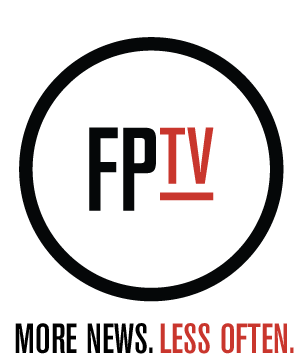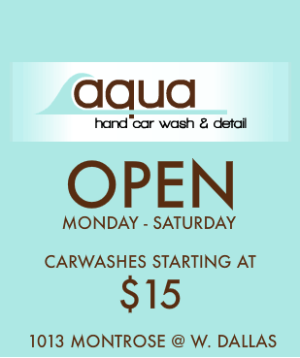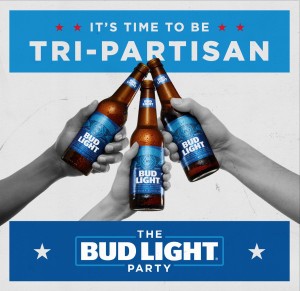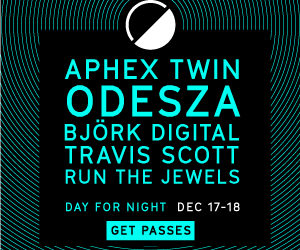It Really Is An Art: An Interview with MAKJ
MAKJ. Courtesy of the artist’s Facebook
With our appetites growing bigger and bigger each day as the holidays arrive, the notorious Clé Houston has a juicy Thanksgiving eve special this year with California based DJ MAKJ on the menu. MAKJ comes from a very unique and tasteful background starting from an open-minded yet hard working, driven family, all-embracing musical influences and mentors, and an undeniable passion for his career pursuits and devoted followers. Free Press Houston had the opportunity to chat with him and pick his brain a bit to further understand what truly makes him MAKJ.
Free Press Houston: Taking a look back, you have been DJing and producing for about 10 years now, did teenage MAKJ ever imagine his music career blowing up to this proportion when he first scooped those 1200’s [Technics] back in China?
MAKJ: Probably not. DJing wasn’t too big in the states around that time so I really never thought the industry would get to the point where it’s at today. Now it’s like DJs are the new rockstar. It’s almost to the point where as a musician I can talk to anyone that doesn’t know anything about music but they’ll know, “Oh a DJ, I know who Tiesto or I know who Diplo is.” It’s crazy to me how the industry has gotten to this point, it’s cool for a lot of guys including myself, I made a career out of it and I am currently sitting in my studio right now making music on a Thursday afternoon, it’s crazy. So definitely not, I never really thought it would get to this point.
FPH: You were on a different career path when you were out there in China and I am pretty curious about that, so you were going to be a professional race car driver?
MAKJ: Yeah, I had a pretty intense childhood. My step dad is really big into racing and he actually still races to this day, he owns a team and that’s his priority, that’s his job. So I have two older brothers and none of them wanted to kind of relive his past I guess and I was like, “I’ll do it!” I didn’t have to go to high school, I got to drive cars. It was more of a hobby when I was like 10, 11, 12, then it started turning out to be a serious passion of mine and, of course, my step dads. It turned out to be a crazy childhood but that’s actually how I got into DJing. I was living in Asia and I would go out to the clubs almost every single weekend because there really wasn’t an age limit over there, it’s more like if you’re above a certain height you could get into the clubs. So I would go out when I was like 15-16 and kind of do that shenanigans that young and really get to see what a club was like because over there it’s insane. It was eye opening for me getting to see a DJ for the first time, I was like, “Whoa what is he doing? He’s mixing an AC/DC record with a Beastie Boys record.” I was blown away, I thought it was pretty rad, I was that guy at that club that night. I was looking at what he was doing the whole entire night and he was like, “Dude can I help you? I’m making music.” We call that trainspotting.
FPH: That must’ve been crazy fun, how long were you in China?
MAKJ: I grew up in California and I moved to China when I was about 15-16 because it was a lot cheaper to race over there. The series that I was racing in here in the states was really expensive and my parents couldn’t afford it so one day they said, “Hey we found some sponsors, they are based out of Macau in China and they are willing to sponsor you for a full ride over there in Asia,” so we took it. It was just an opportunity that I couldn’t pass up that lead to this.
FPH: Transitioning pursuits from driving on the tracks to laying down the tracks must’ve been a surprise to your family considering that big move we were just talking about. Who or what was the influence that sparked that musical drive in you?
MAKJ: I grew up in San Luis Obispo, it’s a really small town in California, there’s about 40,000 people that live here so it’s super small. It’s between LA and San Francisco so I was really big into surfing and traveling with my buddies, you know, just being a teenager. I grew up listening to a lot of eclectic music like a lot of classic rock, a lot of really low key reggae, and I was always that guy with the iPod going -no let me plug it in, let me plug it in, let me give you this cd. I would always make my buddy CD’s, I was that guy in the group of 5 of us. Music was very interesting to me and I was always the kid that was listening to really weird stuff, I was listening to like Savage Garden when I was like 11 years old. My brothers were listening to like N’Sync and Backstreet Boys and I was listening to Savage Garden and Metallica. I just grew up listening to really cool music and my parents didn’t really care what I listened to. They weren’t the type of people that were like, “Oh no, parental advisory, that’s not gonna happen.” My mom would give me 20 bucks and I could go into the music store and buy as many records as I wanted when I was like 10 years old. I just come from a really rad family, that’s basically how my music started.
FPH: I read that you had the chance to have some private scratch lessons/sessions with the late great DJ AM. How did you two get set up together and how did that relationship drive you as a growing artist?
MAKJ: It was definitely a lot more than private scratch lessons. It’s kind of like a misconception when people read that “[DJ] AM taught him,” he never really taught me anything. Once I started DJing and once I started dabbling with making my own music and making edits for these other DJs, I really didn’t think that there was a career out of it, so I would just give everything out to all of my friends that were DJs. I went to meet my buddy who let me open for him when I was 20 years old at a club in LA and [DJ] AM was there. AM was asking, “Yo who is this kid” and my buddy who let me open for him told him, “This is the guy [MakJ] that always plays edits, if you ever want any edits you should hit him up,” and Adam said, “Yea for sure!” So a couple of days later he hit me up and said, “Hey man I’m friends with Paul, he gave me your number and said you have some edits, do you think I can have some?” and I didn’t know who the guy was, I didn’t know who AM was, I wasn’t really into the scene and I didn’t think, “Oh, I need to Google him or something.”So I sent him a bunch of edits and he said that my stuff was pretty rad and he asked me to go down and show him how I did them. So I go down to LA and that’s how we met. It really wasn’t really just ‘he just taught me how to scratch,’ it was more of a friendship. He ended up being like a father figure to me, he taught me who I should hang out with and what clubs I should go to and who I should watch out for. He really had his hand over my head and he would tell me, “Well you need to do this, you need to do that and you definitely don’t need to do this.” It was a cool experience for about a year and a half.
FPH: That’s really awesome, do you have a fond memory looking back that really pops out to you?
MAKJ: I remember one time in Vegas we were sitting down eating and there was like 5 of us, he was sitting next to me, and Adam he said, “This is the guy, if you ever want to play in Vegas this is the guy his name is Jesse Waits” and the name just stuck to me you know, Jesse Waits, it was easy to say. About 2 years later I got my first residency in Vegas and it was at XS, the guy that booked me, his name was Jesse Waits. That was one of the fondest memories I have of what Adam did, he helped me get that residency at XS, my first ever residency and I was playing in the best club in Las Vegas. That was pretty memorable.
FPH: So to be honest I am a pretty big fan of learning the fact and I have to ask, where are the Technics and are you still practicing the art of scratching?
MAKJ: You know what, the art of scratching is the art of scratching. It’s one of those things that a lot of kids don’t really give a shit about anymore. I could literally be playing in front of 25,000 people and have cameras on my turntables and on my hands and I could stop the music and start scratching and no one would know. It’s a lost art and it’s sad because 2 or 3 years ago it was really dope I mean Q-Bert, D-styles all these DMC guys were really pushing it and they still are but it’s a lost cause, a lot of kids don’t really care, fans don’t care. There are a lot of videos out there of myself and A-trak, TJR, a lot of these guys that are still DJing and trying to scratch and really trying to push it still, but it’s hard. Really putting the effort to show these kids that it really is an art, it’s really hard because there’s only so much you can do with a scratch. There was a video I was watching of DJ Snake and I never even knew he could scratch, there was a video of him doing it and I was like- wow that’s super rad there’s another guy out here pushing it, but no one cared, no one cared and it just sucks but that’s the way of the generation I guess.
FPH: Other than touring around the world and killing it behind the decks while on stage, what equipment do you prefer to use when you are in the studio?
MAKJ: I recently just got a lot of new stuff for my studio. I just released a remix of Rae Sremmurd’s “Black Beatles” and I did that actually just on my laptop with my headphones. I mean it’s endless, that’s the beauty about producing you can be anywhere and produce a song from scratch and have it sound just as good as something on the radio which is nuts. I use Logic, nothing crazy, and I just got an endorsement by Universal Audio which is dope, so shout out to Universal Audio for giving me a bunch of free stuff. It’s endless with production.
FPH: Do you practice any other musical instruments?
MAKJ: I can’t play a musical instrument for the life of me. I can’t even do a cord on a guitar or a piano. It’s pretty funny when people come into my studio and ask if I can play the piano and I tell them no and they are like really? It’s basically a fake industry.
I just think DJing has opened my eyes to music and I produce a lot of the stuff that works for me and my DJ sets and I guess that works for a lot of other people. That’s how I go about producing, if this is going to be playable I am just going to make it and if I really want to try some different stuff I will do that for my own sake and release it on my own time. But a lot of the stuff that has made me MAKJ or who I am with my style is because it’s been really playable and it’s been playable for a lot of these DJs so that’s how I have gone about it.
FPH: I love the fact that you are so responsive via social media and I know fans can appreciate it as well. I saw that you have an app for easy access to you and your music. Can you explain the functionality behind it and what it means to you to keep that personal communication with your fans?
MAKJ: That was a very, very intense question. Social media is social media and everyone always has their phone in their hands so might as well reach everyone with their phone, it’s always on them. My team and I thought of an app, it’s crazy too because the app hasn’t even been released yet, but the app is the way of letting me communicate with my fans on more of an almost romantic level, I am closer to my fans having them help me throughout my career so I want to give back to them. Facetiming them when they are producing, going over their projects, it’s just one of those things where if I didn’t have the help that I had when I was early on in my career I would never be where I am at today so might as well pass that down. I want to show everyone it isn’t as easy as I’m telling you it is, you have to put in that work and put in that time. That is basically what I did, I just worked my ass off until that happened.
FPH: I got really excited when I found out about your radio show, I have my own that I have been producing for about a year now and it’s been a very rewarding experience showcasing artist growing in the industry. What is the name of your show and what is the format you follow?
MAKJ: The format is anything, it’s kind of like my DJ style. The problem is I do a weekly show and to do a weekly show it gets super hard, you have to always spend a full day doing it and formatting it. It’s a live mix, an hour long set on SirusXM, it’s called Revolution Radio and I am now done with 200 shows. It’s open format, basically how I play when I am live.
FPH: Do you book other artists for you radio show?
MAKJ: I do a lot of guest stuff but it is always around festival season because I can access them easily. I always do guest appearances when I am in New York, I go to SirusXM and I bring some cool people in. Everyone that I interview usually has their own radio show so it’s always hard to fill them in so I bring talent in when I can. It takes a lot of time and it’s just usually easier for me to do an hour mix in my studio.
FPH: I just wanted to congratulate you on all of your accomplishments so far, we are the same age and it’s pretty incredible seeing such success in your career that seemed to happen pretty fast. What has been the hardest part of your music career so far? Can you name one time that sticks out when you felt like you just couldn’t deal?
MAKJ: Yeah, there has been a lot. If you ask my manager this question he will tell you every single day is hard you know. It’s been a battle from writer’s block, to traveling, to not seeing my family and my friends, my social life is non-existent. It’s one of those things where a touring artist is actually a touring artist. Everyone kind of has a different perspective of what we actually do as artist. If you ask anyone this question they will kind of tell you the same thing, it’s really hard to be away, it’s hard to be traveling every single day. It’s almost like a fairy tale life that you don’t know how long it’s going to last for and you’re always competing with everyone else. So when that drive stops, when the drive stops and if you wanted to work on music and you’re doing it every single day and you’re playing festivals every single day and it’s just the same old same old every single day you start getting really really annoyed. I had to go through that last year, it was my 4th year touring I believe. In 2024 I think I was the second highest touring act in the United States, I think I toured almost 340 shows in a year, it’s almost like 2 shows a day. It’s really hard, it’s to stay healthy, like I said, to stay close to family, friends, girlfriends, boyfriends, whatever. It’s one of those things that takes a toll on your body and if you figure out a routine and you start to be more conscious about it then you feel like you’ve solved the problem.
FPH: All of the serious questions are out of the way and I wanted to fit in one lighter question before the end of the interview, what is your favorite go-to food while on tour?
MakJ: Geez, I don’t know. Maybe if you would’ve asked me this 2 years ago I probably would’ve said Sour Patch Kids. I cook a lot when I am home and I really get into going and finding really low key spots in the cities that local people eat at. There’s this one show called “Fuck That’s Delicious” with Action Bronson and I watch that almost every single day and it’s eye opening to me because he does the same thing I do when he goes out, he does what I want to do. I like trying new stuff, I am open to anything. There isn’t really a favorite food but if I could eat one thing for the rest of my life it would probably be waffles or something.
MAKJ performs tonight at Clé Houston (2301 Main).











![FPH_2016_AdPackage_Lovebuzz_420x75-FeaturedBanner[Mobile]](../2016/08/wpimages_subdomain/FPH_2016_AdPackage_Lovebuzz_420x75-FeaturedBannerMobile.png)

